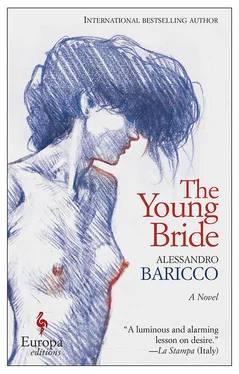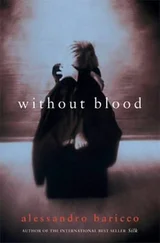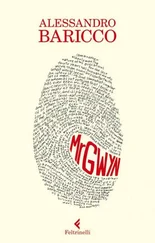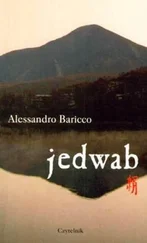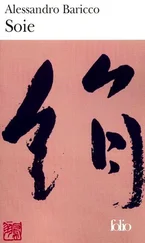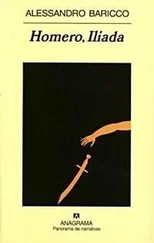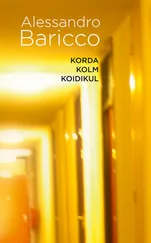How many times does she do it? asked the young Bride in a serious tone.
Usually four, answered Modesto, imperturbable.
So it wasn’t a surprise to see the cars leave, stop after a certain distance, back up, and spit out the Mother, who this time walked up the path to the house, apparently furious, her steps heavy, cursing softly in an uninterrupted litany of which the young Bride caught, as she passed, an indefinite fragment.
Let them all go to hell.
Or maybe “yell,” it was hard to tell.
The Mother re-emerged from the house, after an absence longer than the previous ones, clutching in her hand a piece of silverware, and waving it in the air. She seemed no less furious than before. As she passed, the young Bride discerned that the litany had veered toward French. She seemed to recognize distinctly the word connard .
But it could also be moutarde , it was hard to tell.
Since Modesto raised an arm to wave, the young Bride understood that the ceremony was concluding and so she, too, with sincere happiness, and perhaps a tinge of regret, began to say goodbye, standing on tiptoe and waving her hand in the air. She saw them growing distant, in a cloud of dust and emotion, and for a moment she was gripped by the fear that she had demanded too much from herself. Then she saw the two cars stop.
Oh no, she let escape.
But this time they didn’t back up, and it wasn’t the Mother who jumped down off the running board. Amid the dust they saw the Daughter running toward the house, with her crooked gait, but heedless and decisive, even beautiful in her vaguely childish hurry. She stopped in front of the young Bride.
You won’t run away, right? she asked in a firm voice.
But her eyes were tearing, and it wasn’t because of the dust.
I’m not even thinking of it, said the young Bride, surprised.
Here, let’s make it so you won’t run away.
Then she went up to the young Bride and embraced her.
They remained like that, for a few moments.
The Daughter, returning to the car, was no longer in a hurry. She walked with her sad, dragging gait, but she was serene. She got in without turning around again.
Then they all disappeared around the first bend, and this time they had really left.
Modesto let the snorting of the two automobiles disappear in the distance of the countryside, then, in the regular silence of nothing, heaved a faint sigh and picked up his suitcase.
I’ve left you three books, hidden in the bathroom. Three texts of a certain notoriety.
Really?
As I told you, the pantry is full of food — be content with cold meals and don’t touch the wine cellar, except in case of absolute necessity.
The young Bride had trouble imagining what a case of absolute necessity might be.
I’ll leave you my address, in the city, but I wouldn’t want you to misunderstand. I’m leaving it only because, if the Son really should arrive, he might need me.
The young Bride took the piece of paper, folded in two, that he was handing her.
I think that’s everything, Modesto concluded.
He decided that at that precise moment he was starting his vacation, so he went off without taking the first steps backward, as his most glorious number would have required. He confined himself to a very slight bow.
The young Bride let him go a few steps, then she called to him.
Modesto.
Yes?
Isn’t it a burden to have to always be so perfect?
No, in fact. It releases me from seeking other purposes for my actions.
What do you mean?
I don’t have to ask myself every day why I live.
Ah.
It’s comforting.
I imagine.
Do you have other questions?
Yes, one.
Tell me.
What do you do when they leave and close the house?
I get drunk, Modesto answered with unpredictable readiness and heedless sincerity.
For two weeks?
Yes, every day for two weeks.
And where?
I have a person who takes care of me, in the city.
May I go so far as to ask what type of person it is?
A likable man. The man I’ve loved all my life.
Ah.
He has a family. But it’s arranged so that in those two weeks he comes to stay with me.
Very practical.
Rather.
So you won’t be alone, in the city.
No.
I’m happy for that.
Thank you.
They looked at each other in silence.
No one knows, said Modesto.
Evidently, said the young Bride.
Then she waved, even though she would have liked to embrace him, or even kiss him lightly, or something like that.
He understood, and was grateful for her composure.
He walked away slowly, slightly bent, immediately distant.
The young Bride went into the house and closed the door behind her.
It was a torrid summer, that year. Horizons vaporized tremulous dreams. Clothes stuck to the skin. Animals dragged themselves along insensibly. It was hard to breathe.
It was even worse in the house, which the young Bride kept closed up, with the idea of letting it seem deserted. The air stagnated lazily, sleeping in a kind of damp lethargy. Even the flies — usually capable, it should be noted, of inexplicable optimism — seemed unconvinced. But to the young Bride it didn’t matter. In a certain sense, she liked moving slowly, her skin shining with sweat, her feet seeking the comfort of stone. Since no one could see her, she often went through the rooms naked, discovering strange sensations. She didn’t sleep in her bed, but around the house. It occurred to her to use the places where she had seen the Uncle sleeping, and so she inhabited them one after the other, in sleep. When she slept in these places naked, she felt a pleasant agitation. She had no schedule, because she had decided to let the pace of the days be dictated by the urgency of her desires and the pristine geometry of her needs. So she slept when she was sleepy, she ate when she was hungry. But don’t think that it made her wild. For all those days she took meticulous care of herself — after all, she was waiting for a man. She brushed her hair repeatedly, she spent long moments at the mirror, she stayed in the water for hours. Once a day she dressed with the utmost elegance, in the Daughter’s or the Mother’s clothes, and in her splendor she sat in the big room, reading. Occasionally she felt oppressed by the solitude, or by an uncontrollable anguish, and then she chose a corner of the house where she recalled having seen or experienced something noteworthy. She would crouch down, open her legs, and caress herself. As if by magic, everything resettled itself. It was a strange sensation to touch herself on the chair in which the Father had asked to die with her. It was also remarkable to do it on the marble floor of the chapel. When she was hungry she got something from the pantry and then went to sit at the big table for breakfasts. As noted, it was traditional to leave twenty-five places, flawlessly set, as if at any moment a horde of guests were to arrive. The young Bride decided that each time she would eat at one of those places. When she finished eating, she took everything away, washed, cleaned, and left the place at the table empty, the place setting gone. So her meals were like a slow hemorrhage through which the table lost meaning and purpose, progressively emptied of every jewel and any ornament: the blinding white of the tablecloth advanced, naked.
Once, having inadvertently fallen asleep, she was wakened by the sudden certainty that waiting for a man, alone, in that house, was a tragically vain and ridiculous act. She was sleeping, naked, on a carpet she had unrolled in front of the door of the living room. She looked for something to cover herself with, because she felt cold. She pulled a sheet that was covering a nearby chair over herself. Mistakenly, she went back over her life in her mind, to find something that would break that strange, sudden fall into emptiness. All she did was make things worse. Everything seemed to her wrong or horrible. The Family was crazy, her trip to the brothel grotesque, any phrase uttered with a straight back absurd, Modesto cloying, the Father mad, the Mother ill, those places ignoble, her father’s end disgusting, the fate of her brothers desperate, her youth wasted. With a lucidity one has only in dreams, she understood that she no longer possessed anything, that she wasn’t beautiful enough to save herself, that she had killed her father, and that, little by little, the Family was robbing her of her innocence.
Читать дальше
